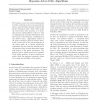Free Online Productivity Tools
i2Speak
i2Symbol
i2OCR
iTex2Img
iWeb2Print
iWeb2Shot
i2Type
iPdf2Split
iPdf2Merge
i2Bopomofo
i2Arabic
i2Style
i2Image
i2PDF
iLatex2Rtf
Sci2ools
123
click to vote
ICML
2007
IEEE
2007
IEEE
Bayesian actor-critic algorithms
We1 present a new actor-critic learning model in which a Bayesian class of non-parametric critics, using Gaussian process temporal difference learning is used. Such critics model the state-action value function as a Gaussian process, allowing Bayes' rule to be used in computing the posterior distribution over state-action value functions, conditioned on the observed data. Appropriate choices of the prior covariance (kernel) between stateaction values and of the parametrization of the policy allow us to obtain closed-form expressions for the posterior distribution of the gradient of the average discounted return with respect to the policy parameters. The posterior mean, which serves as our estimate of the policy gradient, is used to update the policy, while the posterior covariance allows us to gauge the reliability of the update.
Related Content
| Added | 17 Nov 2009 |
| Updated | 17 Nov 2009 |
| Type | Conference |
| Year | 2007 |
| Where | ICML |
| Authors | Mohammad Ghavamzadeh, Yaakov Engel |
Comments (0)

